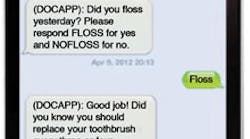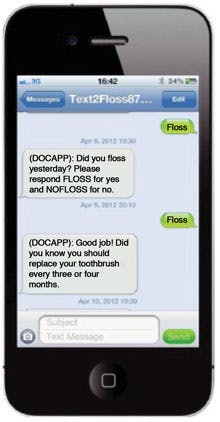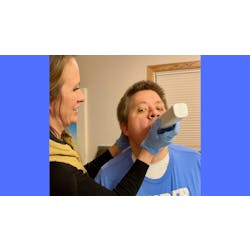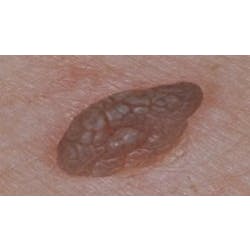By JoAnn R. Gurenlian, RDH, PhD
A year ago, a new program was launched with the goal of raising awareness about the importance of oral health and improving oral home care regimens. During the opening session of the ADHA's 100th anniversary, this new initiative, Text2Floss, was announced.
Text2Floss is a messaging service created by the Arizona School of Dentistry & Oral Health (ATSU) in partnership with CellTrust Corporation. The result of this collaboration is a series of text message programs designed to reach the public, educate them about their oral health, and remind them of the importance of daily oral hygiene, including flossing. The program was created with the understanding that over 85% of Americans own a cell phone, and 72% of cell users send or receive text messages. Already, many dental and dental hygiene practices are using Facebook and other websites as a means to communicate with their patients, sending appointment reminders, requesting feedback about patient experiences, and providing key oral health education messages.
Why not texting?
Texting is a very popular means of communication. Oral health information can be delivered simply and conveniently. The Text2Floss program offers a simple registration process for patients that can be done online or by phone. Using a cell phone, text the word "Floss" to the number 878787. Next, enter your age category. Once registered, text messages with tips on oral care will be sent. A text message about flossing will be sent for seven days at 7:30 p.m. MST. After the seven-day period, a message is sent to receive a coupon to purchase an oral health product. If patients no longer wish to participate in the program, they can text STOP to 878787. To resume the program, they enroll again by sending "Floss" to the same number.
Standard message and data rates apply according to each person's plan with their wireless carrier. There is no charge if individuals have an unlimited text message plan that includes sending and receiving text messages.
-----------------------------------------------------------
Other columns by Gurenlian
-----------------------------------------------------------
Visiting text2floss.com revealed more than a friendly reminder to floss daily. The site notes, "Your smile is one of the first things people notice about you. That's why it's so important to take care of it." Educational information is offered concerning saliva and the pH of oral health, heart disease and oral health, stress, and diabetes. References are offered should the reader wish to click on another site and learn more.
While attending an international dental conference in Dubai in February, I met with Drs. Jack Dillenberg, Dean, and Tony Hashemian, Assistant Dean for Global Oral Health, from ATSU. Both were promoting Text2Floss at the conference and were hoping that a partnership could be formed with the International Federation of Dental Hygienists to spread the word about this oral health messaging program. To date, ATSU has partnerships with the ADHA, Reach Floss, and Listerine division Johnson & Johnson, Dentaquest Foundation, and Dentrix. The program has been showcased at major dental conferences and has been expanded to now be available through the Dentrix system and as an app for iPad, iPad mini, and iPhone, and on iTunes at https://itunes.apple.com/us/app/text2floss/id797806327?mt=8.
Further, a randomized clinical trial was conducted to determine if this option improves oral health knowledge and behavior in mothers of young children. One hundred and fifty-six mothers from a private practice and community clinic were recruited, and randomly assigned to a control or text group. Oral health behaviors and knowledge were assessed pre- and post-intervention. Mothers in the text group received text messages for seven days asking about flossing and providing oral health information. Findings showed no difference in knowledge and behavior between the control and text group at baseline. However, post-intervention showed that the text group mothers flossed more, had increased knowledge, tried to improve their child's oral health behaviors, and decreased their child's soda and sugary snack use more than the mothers in the control group.1
From personal experience, I can relate that Drs. Dillenberg and Hashemian care deeply about findings ways to improve the oral health and total health of the public. They are committed to motivating their oral health colleagues to embrace technology as the wave of the future. Their enthusiasm is contagious. We all know how difficult it is to motivate patients to brush and clean interdentally. Patients routinely tell us that they don't have time or don't really feel the need to invest in their oral health with a daily home biofilm management routine.
Yet, we all know that feeling of triumph and satisfaction when a patient does adhere to our home care recommendations and their oral health is improved. We do mental happy dances, fist pumps, and salutes. We also know all too often the disappointment when a patient has the same signs of oral inflammation and disease because they are not taking care of their mouth health. We look for any answer to help them understand their oral health status and motivate them to improve. Maybe Text2Floss is another avenue to explore. One more patient with better oral health is one more than before. Try it! RDH
Reference
1. Hashemian T, Kritz-Silverstein D, Baker R. Text2Floss: A randomized clinical trial of an innovative option to improve oral health behavior. Abstract. American Public Health Association Annual Meeting 2013.
JOANN R. GURENLIAN, RDH, PhD, is president of Gurenlian & Associates, and provides consulting services and continuing-education programs to health-care providers. She is a professor and dental hygiene graduate program director at Idaho State University, and president of the International Federation of Dental Hygienists.
Past RDH Issues






